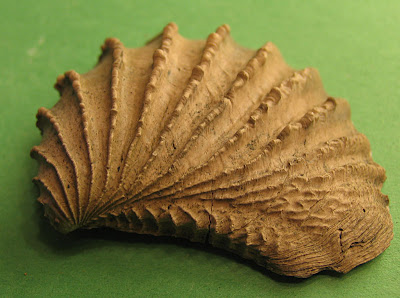It became state fossil in 1998.
This creature might be related to the Myophorella ("Trigonia") of the Jurassic Period which has the modern relative of the Australian Broach Clam (Neotrigonia margaritacea). Learn more at this British website: Fossils of the Kimmeridge Clay (Southern England) by Ian West.
The genus was named by van Hoepen in 1929.
Thanks to Herb for allowing me to photograph it.


 Update: August 2010, here is a picture of two Trigonia on display at the Smithsonian Museum of Natural History in Washington, D.C. The ones on the top are Trigonia thoracica (Late Cretaceous Period, Tennessee) and the bottom one is Trigonia moorei (Middle Jurassic Period, Australia).
Update: August 2010, here is a picture of two Trigonia on display at the Smithsonian Museum of Natural History in Washington, D.C. The ones on the top are Trigonia thoracica (Late Cretaceous Period, Tennessee) and the bottom one is Trigonia moorei (Middle Jurassic Period, Australia).







